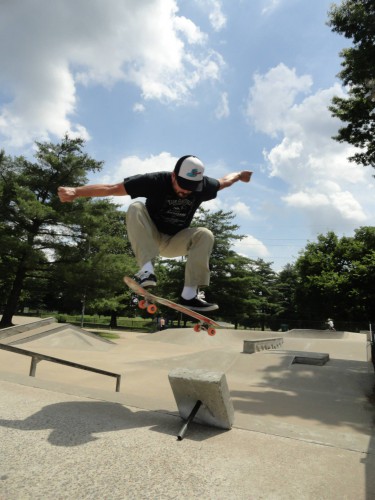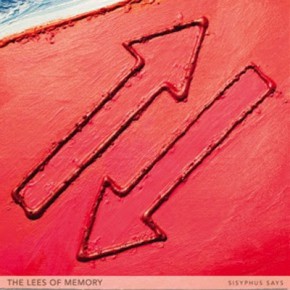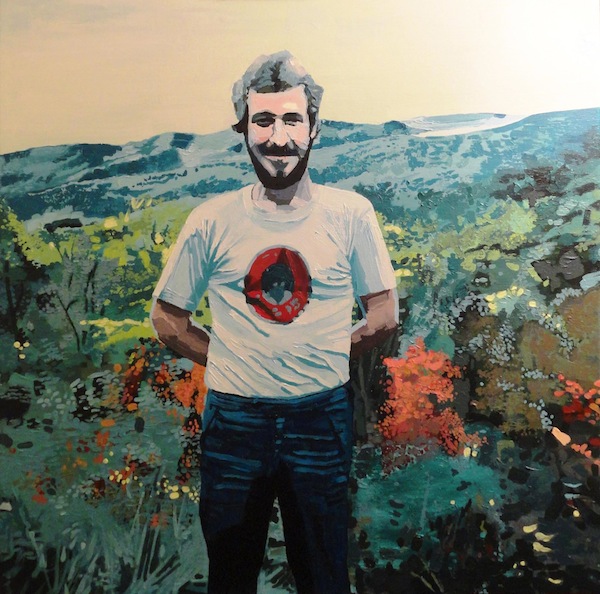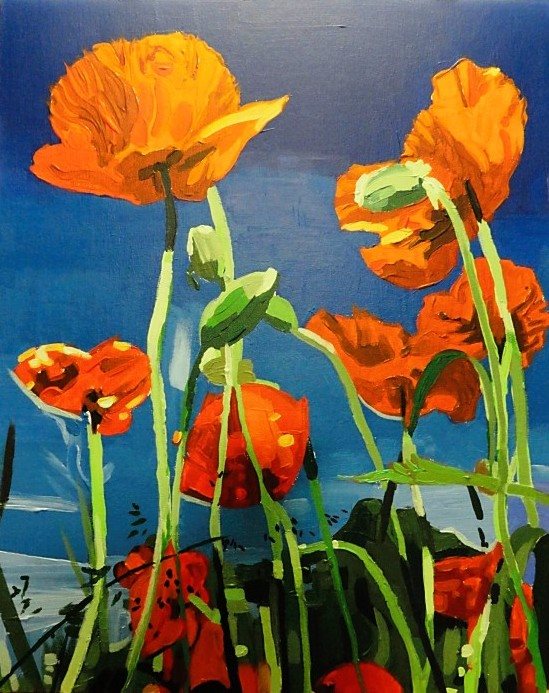
Many thanks to Josh Encinias for arranging, carrying out, and writing up this interview with one of our all time favorites, John Davis.

John Davis doesn’t just shred on guitar.
Last Wednesday was Christmas morning for true believers. John Davis (The Lees of Memory, Superdrag) dropped demos for his scrapped third LP. While the 20 demos on Heart Medicine: Hypothetical Solo Jamz Vol. III: 2007-2013 aren’t a cohesive bunch — ranging from gospel tunes to hardcore — Davis didn’t pick these tracks from the musical scrap heap.
I was introduced to JD when he opened for the OC Supertones’s “final” show back in 2005 (don’t hate on the Supertones). I’ve followed his career ever since. When Superdrag reunited a few years back, I was in college and caught one of their shows on the Lower East Side (and basically stalked them around the Bowery Ballroom). The band let me hang out, interview them (Patrol Magazine graciously published it), and they bought me Thai food. Yes, I’m bragging.
Heart Medicine is the answer to JD’s post-Arigato! years. These songs gave me a bunch of questions about Superdrag’s last stand, his new solo demos, and what’s next for The Lees of Memory. John Davis was kind to answer my questions in the interview below.
Mbird: Do you think there was an element of American Dream-style ‘self-creation’ fueling Superdrag’s original run in the 90s that ultimately led to the band/your ‘self-destruction’?
JD: Hmm. I’m not sure. I guess there’s always some degree of “self-creation” involved with forming any band. You know, you’re creating that initial blast of material as sort of a statement of intent, with a unified front and a collective identity. “This is us. And it’s us against the world.” I don’t remember spending much time at all ruminating on our piece of the American Dream, though. But if the American Dream is, in so many words, “you can be anything you want to be if you’re willing to work hard enough for long enough,” then, yeah, I suppose we did that. We were all-in and fully committed to it almost from the very beginning. The “Sucked Out” lyrics had more to do with hanging your whole future on one dream, in this case, getting a band together and making a record… and when you achieve that one thing by age 21, and it’s ultimately pretty unsatisfying… then what?
Mbird: Tell us about the time immediately following the release of Arigato! and the demos on Heart Medicine: Hypothetical Solo Jamz Vol. III: 2007-2013.
JD: Well, first of all, it took a year from the time we finished Arigato! to get it back out from under contract to a company that ceased to exist. That was a huge hassle. But in the end, I guess it could’ve been much worse. The first time I ever opened a box of them and put one out for sale on a merch table was at the Superdrag show here in Nashville at City Hall. Which is now an Urban Outfitters. That’s pretty depressing. Anyway, if memory serves, that was on October 5, 2007. I had been writing steadily in the meantime; I mean, I go through weeks or months when I’m out of ideas from time to time, but I’m pretty much always writing. Like, I already had “Try” and “I Only Want A Place I Can Stay” and several others when it came time to sort out what songs might work for Industry Giants. I think the impulse to make a record was just sort of a natural reaction to that first phase of “reunion” shows being so well-received. We were pretty taken aback by how stoked people were to see the band again. So we made the record the best way we could, which was more or less guerrilla-style. We worked at 3 different studios, and we would pretty much show up with no rehearsal, work up the songs on the spot and track them as quickly as possible. Like, “how much can we get done in 2 12-hour sessions?” kind of thing. I still back it, and I’m glad we did it, but it wasn’t easy.
We did SXSW the week before it came out, and it was probably one of the best times I’ve had at SXSW. But what we found out was that the band was worth more to people as some kind of a 90s throwback, nostalgia trip kind of thing than it was as 4 middle-aged men trying to make something new and move the story forward into the future. I guess that’s probably pretty common. Plus, the economy went in the tank simultaneously. We decided to attempt making a comeback at the exact moment when everybody stopped buying records and stopped going to shows. Classic Superdrag decision-making. There was sort of a rough baseline for what we thought we’d agree to go out and play for which ultimately ended up being pretty unrealistic. Those offers just stopped coming. There were differences of opinion related to all of that, and when you start talking about child care, vacation days, temp jobs, whatever, you know, all of us had long lists of personal things that took precedence over being in band and touring. Particularly when it came down to a question of diminishing returns. At least for us, a certain degree of “bang for buck” had to be there in order to justify putting life on hold to go play shows. And you’ll never see me on the “Superdrag Plays Blank Album From 17 Years Ago In Its Entirety” circuit. That’s just not going to happen.
 But I had more songs immediately after the Industry Giants session wrapped, and I kept writing during the brief cycle of touring it, etc., thinking there would probably be a 6th album eventually. Once it became pretty clear that there wouldn’t be another Superdrag album, at that point I guess I continued writing without having much of a clue what for, really. I was pretty bummed for a while and honestly I kinda lost my joy. I just felt like it was time for a completely blank slate. Like, I didn’t want to embark on something “new” creatively that was instantly tethered to something I did when I was 21. Making the Lees Of Memory record with Brandon, Nick and Nick was a shot in the arm I really needed. There were moments of frustration, too, but in the end it gave me back my joy.
But I had more songs immediately after the Industry Giants session wrapped, and I kept writing during the brief cycle of touring it, etc., thinking there would probably be a 6th album eventually. Once it became pretty clear that there wouldn’t be another Superdrag album, at that point I guess I continued writing without having much of a clue what for, really. I was pretty bummed for a while and honestly I kinda lost my joy. I just felt like it was time for a completely blank slate. Like, I didn’t want to embark on something “new” creatively that was instantly tethered to something I did when I was 21. Making the Lees Of Memory record with Brandon, Nick and Nick was a shot in the arm I really needed. There were moments of frustration, too, but in the end it gave me back my joy.
Mbird: Is “(In A) Parallel Universe” about your last time on the road with Superdrag?
J: No, I actually wrote that on the piano at 606 while we were there tracking Arigato! astronaut pushers played it at the very last show if I remember correctly.
Mbird: The first few songs on Heart Medicine… sound more like the first JD LP than Arigato!. “Tears of Joy” sounds like a b-side to the first record. What was going on with you musically, post-Arigato and Industry Giants, that called you back to a gospel, pop rock sound?
J: I really don’t know. [laughs] Man, I never know, the writing takes itself in a direction sometimes and I just go with it.
Mbird: How hard do you think about song composition, as opposed to sound editing?
J: It’s probably about a 90/10 ratio. The limitations of having 1 58 and a 4-Track compel me to make decisions on the fly and commit, and more often than not, the big-picture sound of a particular song doesn’t stray that much from the 4-Track demo.
Mbird: How important is performance to you now? You don’t get to do it much, or go on tour. Has music taken on a different importance to you because of it?
J: No, music is, has been, and always will be paramount. I’ve been eat up with it for as long as I can remember. But live performance (particularly with the Lees music) is by far the least-interesting aspect of the whole deal to me now. We still haven’t played a show!

The Lees of Memory L to R: Nick Slack, John Davis, and Brandon Fisher.
Mbird: Why did you write “To Thessalonica“? And what is that droning sound in the background?
J: I wrote that when my grandmother died, mostly just to comfort myself with those words. Almost the entire lyric is lifted straight from 1 Thessalonians 4:15-16. And the piano you hear on that version, and any other 4-track demo I’ve ever made, practically, is the same one I practiced on when I was little that belonged to her. The droning sound in the background is a tanpura drone from an electronic shruti box. I was thinking about this yesterday, and I think that, in terms of purely selfish personal gain or whatever, my greatest desire would be to own great examples of every Indian instrument. I’ve been wanting a sitar and a tanpura so hard for like 20 years. But a harmonium, a sarod, a dilruba, just one of everything. That would be so rad.
Mbird: This week you released a bunch of cover songs in The Sincerest Form Of Flattery: Choice Covers: 1995 → 2013 and my favorite track is “Surf’s Up“. What was recording this song like, and how has Brian Wilson influenced you?
JD: I don’t know what to say about the cover version, except that piano part was really difficult for me to work out by ear! Some people really play piano, others of us just push the keys down. So yeah, I learned it once a long time ago, then completely forgot the whole thing and had to re-learn it all. Catch me on the right day, though, and I would probably tell you SMiLE is my all-time favorite album. The original tracks. That music has spiritual, healing powers. Every time I listen to it, I can feel it healing my soul. I longed for that box set for a good 15 years. Brian Wilson, if there’s any chance you might end up reading this, THANK YOU for the beautiful, spiritual music!
Mbird: You’re not codependent on a sound or style. How are you able move fluidly between Bob Mould-sounding tunes, to Brian Wilson gospel? I know there’s no real disparity between them (it’s all music), but so many bands find a sound and run it into the ground. Does it help that you don’t have a financial bottom line attached to the tunes?
JD: Well, having no financial bottom line attached is going to be helpful in any artistic endeavor. As far as sounds go, I rarely… intellectualize it all that much. Like, there have been times where I thought, “OK, I am going to write deliberately in “x” style and focus on it for a while.” Epic Ditch is a good example. But normally I just try to keep my heart open… and wait for lightning to strike pretty much. For the past 7 years or so I’ve done at least 60% of my composing in my mind without an instrument in my hand. I’ll think of a riff or a set of chord changes or a snippet of a melody for a long time until it grows itself into the next bar or a bridge or a chorus or whatever. Then I might end up thinking about the “finished” song for 4 or 5 days in some cases before I actually sit down to an instrument and try to play it. But of course there are still times when I just walk in there, pick a guitar up and knock something out quickly. I write a lot of songs in my head while I’m mowing the yard. I think not being bound to any one style just helps to keep it interesting for me. I hope it’s not too schizo for the listener sometimes.
Mbird: What albums are you listening to right now?
JD: The last couple ones I played were Ravi Shankar’s Homage To Mahatma Gandhi and Raekwon Only Built 4 Cuban Linx.
Mbird: How did you feel about the response to The Lees of Memory record? Why is Sisyphus the reference of choice in 2014? Sufjan Stevens has a hip hop group called Sisyphus, etc. Is there more Lees coming, and will the sound be as varied as the first record? Seemed simple minded for people to label it ‘Superdrag shoegaze’ and leave it at that.
J: We just wanted as many people to hear it as possible. We were really thankful to have SideOneDummy’s help, they certainly elevated it to a level we couldn’t have achieved on our own. We were thrilled to see and hear how much people enjoyed it. It was such a pleasure to make, it was kind of a win before it ever came out. All this is extra. As far as Sisyphus goes, he’s everywhere. He’s pretty much the poster boy for human history. Think about him the next time you unload a dishwasher. There will definitely be more Lees music coming. We’ve got 23 new songs as of today, and they’re down to make a follow-up LP. And CDs this time! I think the sound is more varied than the first record! I get the shoegaze label, but there was a lot more to it than that.

John Davis, “Portrait Of The Artist’s Father (From A Polaroid, 1979)”, 36″ x 36″, acrylic on canvas, 2014.
Mbird: What drew you to painting? The painting of your dad’s polaroid is striking. Do you get the same thing out of it as you do music?
JD: Well, my wife “commissioned” some work. Prior to that, with one exception I hadn’t really picked up a brush since I dropped out of school. I was heavily into painting in high school and in my short-lived academic career I guess I had some shadowy ambitions towards some kind of a Fine Arts degree. I didn’t stick around long enough to declare a major. When Superdrag got the chance to put out a 45 and go on a tour, that was it for me. I’m glad you like the portrait. I find portraiture to be fairly high-pressure/terrifying. You don’t want to get it wrong, especially if you love that person! It’s a completely different thing than doing music. I think painting is much harder. You’re always working through problems, you know? Problems with color. I limit my palate to phthalo blue, cerulean blue or ultramarine blue, cadmium yellow or yellow oxide, cadmium red, titanium white, and raw umber or burnt umber, so any colors you see in my pieces I’ve mixed from those. You have to work through moments of hating the piece. That happens often. But yeah, I’m back into a regimen of trying to keep a piece rolling on the easel pretty much at all times.

John Davis, “Poppies”, 14″ x 17″, acrylic on canvas board, 2011.
Mbird: What musicians are killing it right now but aren’t getting the love they deserve?
JD: I’m gonna give shouts out to Natural Child, our labelmates on Burger and definitely one of my favorite bands from around here. And they’re also nice enough dudes to tolerate being stalked by me and my kids at the grocery store. I think they’re getting love already and it’s well-deserved. Also want to give shouts out to the homies Hurts To Laugh, those guys have been killin’ it for years and Cliff Cobain is always down to schralp a curb with me.

COMMENTS
2 responses to “Sisyphus Says: Listen to John Davis (An Interview)”
Leave a Reply













Master of arts, Mr. John Davis.
too much talent
“As far as Sisyphus goes, he’s everywhere. He’s pretty much the poster boy for human history. Think about him the next time you unload a dishwasher.” Pure awesomeness. I’m love love loving the new tracks. Davis is an American treasure.